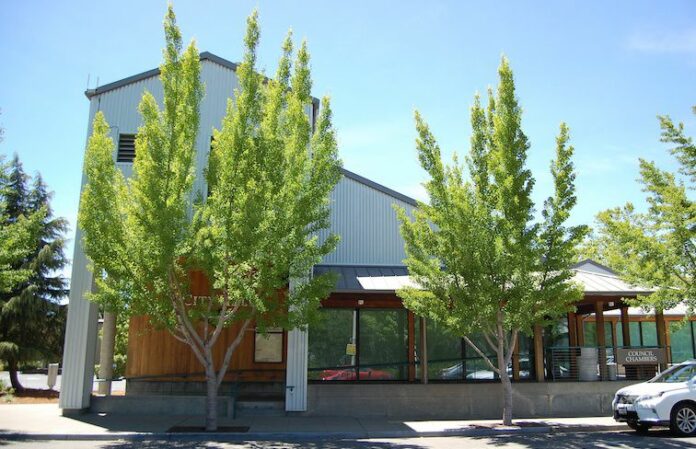The Healdsburg City Council gave its blessing for the city to move forward with its plan to work with Corazón Healdsburg to develop a universal basic income (UBI) pilot program that would provide $500 a month to 50 local families for 24 months.
While no formal action was taken by the council to officially approve the contract work with Corazón, the direction from council gets the ball rolling for the implementation of a UBI pilot program.
UBI is a guaranteed payment provided on a regular basis to each program participant.
The goal of a UBI payment is to provide enough funds to cover basic costs of living and establish a level of financial security for recipients.
The concept of a UBI program, also known as guaranteed income, has been part of a larger city budget discussion across multiple city council meetings.
On Sept. 7, the Healdsburg City Council voted to allocate $250,000 over the 2021-22 and 2022-23 fiscal years for the implementation of a UBI pilot program.
The nonunanimous vote — Councilmember David Hagele and Mayor Evelyn Mitchell held the dissenting votes — followed a slightly contentious council discussion on how to allocate freed up Measure T tax funds to certain city projects and initiatives.
After the September vote, the city received a UBI proposal from local nonprofit Corazón Healdsburg. Corazón proposes to create and administer a program where Corazón would provide $500 a month to 50 Healdsburg families for 24 months.
The proposed program would be open to folks who meet each of the following criteria: City of Healdsburg residents who are pregnant in their first or second trimester and earn no more than 50% of the area median household income.
According to Healdsburg City Manager Jeff Kay, the focus on pregnant women aligns with the parameters of an upcoming State of California funding opportunity.
As stated in the agenda report, “According to Corazón, ‘from 2018 to 2020, Healdsburg had 393 births of which 140, or 36%, were Medi-Cal births for Healdsburg residents. The Medi-Cal births during this time period serve as a proxy to estimate the potential pool of applicants that may be eligible to qualify for an income supplement program, which we estimate to be around 140 during this time period, or about 47 annually.”
The total program cost is estimated to be about $428,200 for a two-year program, leaving $178,200 to be raised from non-city sources.
As the program provider, Corazón would be obligated to conduct at least one public workshop to provide information about UBI programs and solicit community feedback.
During the Oct. 4 meeting, city staff asked for direction from the council on desired next steps in the implementation of a UBI pilot, including whether to issue a request for proposals (RFP) or to work with Corazon and how to best incorporate community engagement into the process.
Kay said while an RFP could result in an open call for organizations to facilitate the program, partnering with Corazón could yield faster results in terms of setting up the UBI program.
“Families are hurting in the community right now and there’s some sense of urgency to get some assistance out there,” Kay said.
It was also recommended for the city to work with Corazón because no other qualified firms have been identified and Corazón is already experienced in administering direct assistance programs in Healdsburg.
Additionally, state and other funding sources may soon be available to supplement city funding. In July, California lawmakers approved the nation’s first state-funded guaranteed income program.
According to CalMatters, once the bill is signed by Gov. Gavin Newsom, cities and counties can apply for funding from a $35 million pot to support current or new pilot programs that prioritize foster youth who recently left the foster care system and pregnant mothers.
“I think it is a good idea and a time saving strategy to partner with them (Corazón). I would like to see a preference for ag and hospitality workers,” said Councilmember Skylaer Palacios.
Vice Mayor Ozzy Jimenez said he believes it’s important to direct staff to work with others in the county on this. He opined that if other resources were leveraged together they may be able to help more people with the program.
“I think working collaboratively is important and I want to lean in to a collaborative approach,” Jimenez said.
Hagele, who had wanted to have some sort of community forum on UBI prior to deciding on a program, expressed frustration in regard to how the process of deciding on an UBI program played out. He had also previously suggested the city consider an RFP process.
Despite Hagele’s concerns, he said in the interest of time, and since there’s council consensus on the item, he would be interested in negotiating with Corazón.
Mayor Mitchell said she shared Hagele’s frustration.
“I do think there is a little cart before the horse,” she said.
However, she added that after the Sept. 7 meeting, she met with Corazón to get to know the organization a bit better and to learn more about their plans for a UBI pilot program. She said she was impressed with them and their proposal.
“We are lucky to have an organization like this and I think we have a good model here,” Mitchell said. “The education of the public is an important component.”
The Corazón UBI item will return to council at a later date for further discussion and approval.









